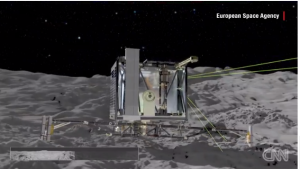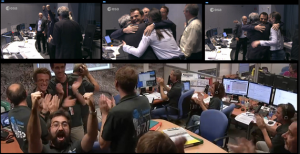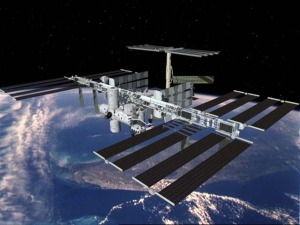The transmission is persistent and widespread.
(Associated Press, November 21, 2014)
 When I read this update, I had a fleeting thought about Rosetta’s Philae probe roving all over Comet 67P and transmitting all kinds of evolutionary data back to Earth.
When I read this update, I had a fleeting thought about Rosetta’s Philae probe roving all over Comet 67P and transmitting all kinds of evolutionary data back to Earth.
No doubt this thought stemmed from the worldwide jubilation and media coverage that attended its successful landing on November 12. Not to mention the suspense rocket scientists at the ESA engendered with their giddy talk about receiving troves of data, which they promised would provide unprecedented insights into the formation of our solar system and the creation of our planet.
Except that this update had nothing to do with the ESA’s Rosetta mission. Instead, it highlighted the latest assessment by health workers at the WHO on the spread of Ebola in Sierra Leone.
I appreciate of course that – with the Ferguson protests, Bill Cosby’s rape allegations, Kim Kardashian’s butt and so many other stories orbiting the Twitterverse – chances are that many of you had already forgotten not only about Ebola, but Rosetta too.
 In any event, here in part is how I commented on this landing, for which I was so predictably trolled:
In any event, here in part is how I commented on this landing, for which I was so predictably trolled:
Given their jubilation (with high-fiving, backslapping, and hugging all around), you’d think they had in fact discovered signs of life out there … somewhere.
But I, for one, remember all too well the jubilation that attended, not just some robotic probe, but man landing on the Moon. And I am hard-pressed to cite ways in which that landing has lived up to the hype and hope it inspired.
(“Rosetta’s Comet Landing: the Robot Has Landed. Great. Now What?!” The iPINIONS Journal, November 13, 2014)
It hardly mattered to my detractors that the failure of rocket scientists at NASA to announce any celebrated discoveries, despite many successful landings on Mars, informed my cynicism.
Unsurprisingly, it appears that cynicism was as prescient as it was prudent, because now comes this:
After an improbable 10-year, 310-million-mile journey to become the first ever space vehicle to make a soft landing on a comet, the Philae probe may have ended its mission prematurely.
Philae was supposed to transmit data from Comet 67P for nine months as it passed the sun, running on solar power, but it did not get its place in the sunlight that scientists had hoped for.
(CNN, November 18, 2014)
Frankly, this probe’s radio silence is surpassed in its frustration only by the ESA’s media silence, which stands in humbling contrast to the way its scientists were regaling every medium, when the probe landed, with great expectations of discoveries to come.
Talk about premature jubilation: After all, this silence can only mean that Philae’s celebrated landing will end up telling us even less about our solar system and planet than similar landings on the Moon and Mars….
 That said, let me hasten to clarify that I’m not opposed to space exploration. In fact, I fully support completion of the International Space Station; not least because it could serve as a self-sustaining home base from which humans could launch Star Trek-like voyages “to [truly] go boldly where no man has gone before.”
That said, let me hasten to clarify that I’m not opposed to space exploration. In fact, I fully support completion of the International Space Station; not least because it could serve as a self-sustaining home base from which humans could launch Star Trek-like voyages “to [truly] go boldly where no man has gone before.”
It just seems foolhardy to expend so much brainpower and resources to collect dirt/rock samples from one of the hundreds of millions of plainly uninhabitable comets scientist believe are traveling through our solar system.
Whereas, for example, such brainpower and resources would better serve mankind by developing such things as biometric tracking technology and “smart[er] bombs.” Given the existential menace terrorism poses, advances in these areas could enable drones to find and take out terrorists, with relatively little collateral damage, whether they’re hiding out in caves in Afghanistan, jungles in Uganda, or condos in Lebanon.
NOTE: Apropos of cynicism, I believe that, if there were other forms of life out there, they would be so much more evolved than earthlings that they would find us before we “discover” them.
Related commentaries:
Rosetta comet landing…